Cross Culture Management: Nepotism and Organizational Ethics
VerifiedAdded on 2023/01/12
|6
|1549
|73
Report
AI Summary
This report delves into the complexities of cross-cultural management, specifically examining the issue of nepotism within organizations. The report is structured around a case study analysis, exploring the differences in organizational culture between the United States and Tanzania, particularly focusing on hiring practices and ethical considerations. The first section discusses organizational culture, organizational structure, and ethics & CSR, highlighting the negative impacts of nepotism. The second section provides a reflective report, detailing group experiences, communication challenges, and the impact of cultural differences on project outcomes. The report concludes by emphasizing the importance of cross-cultural management to mitigate unethical practices like nepotism and promote fair business practices. The report also highlights the importance of a functional organizational structure and ethical behavior to derive positive outcomes.
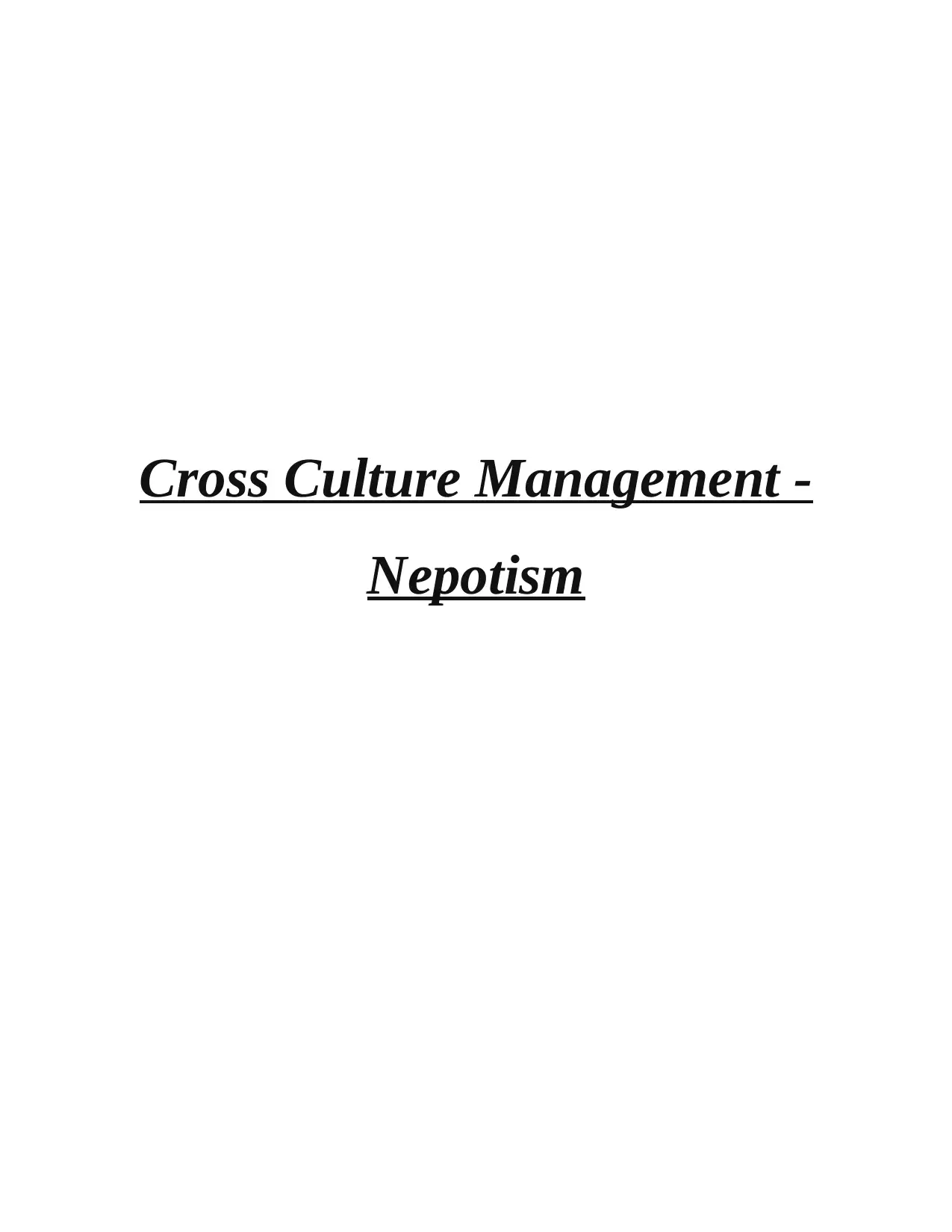
Cross Culture Management -
Nepotism
Nepotism
Paraphrase This Document
Need a fresh take? Get an instant paraphrase of this document with our AI Paraphraser
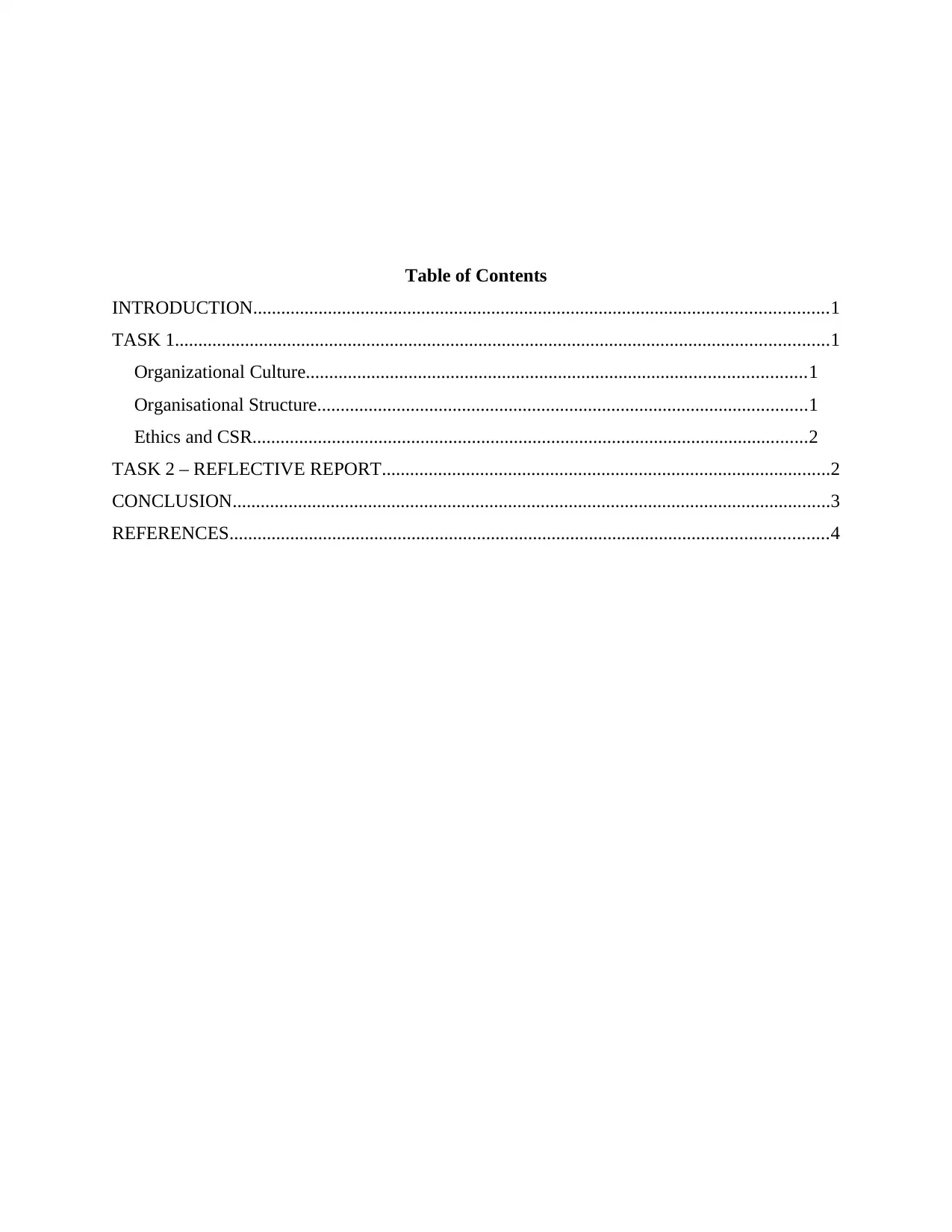
Table of Contents
INTRODUCTION...........................................................................................................................1
TASK 1............................................................................................................................................1
Organizational Culture...........................................................................................................1
Organisational Structure.........................................................................................................1
Ethics and CSR.......................................................................................................................2
TASK 2 – REFLECTIVE REPORT................................................................................................2
CONCLUSION................................................................................................................................3
REFERENCES................................................................................................................................4
INTRODUCTION...........................................................................................................................1
TASK 1............................................................................................................................................1
Organizational Culture...........................................................................................................1
Organisational Structure.........................................................................................................1
Ethics and CSR.......................................................................................................................2
TASK 2 – REFLECTIVE REPORT................................................................................................2
CONCLUSION................................................................................................................................3
REFERENCES................................................................................................................................4
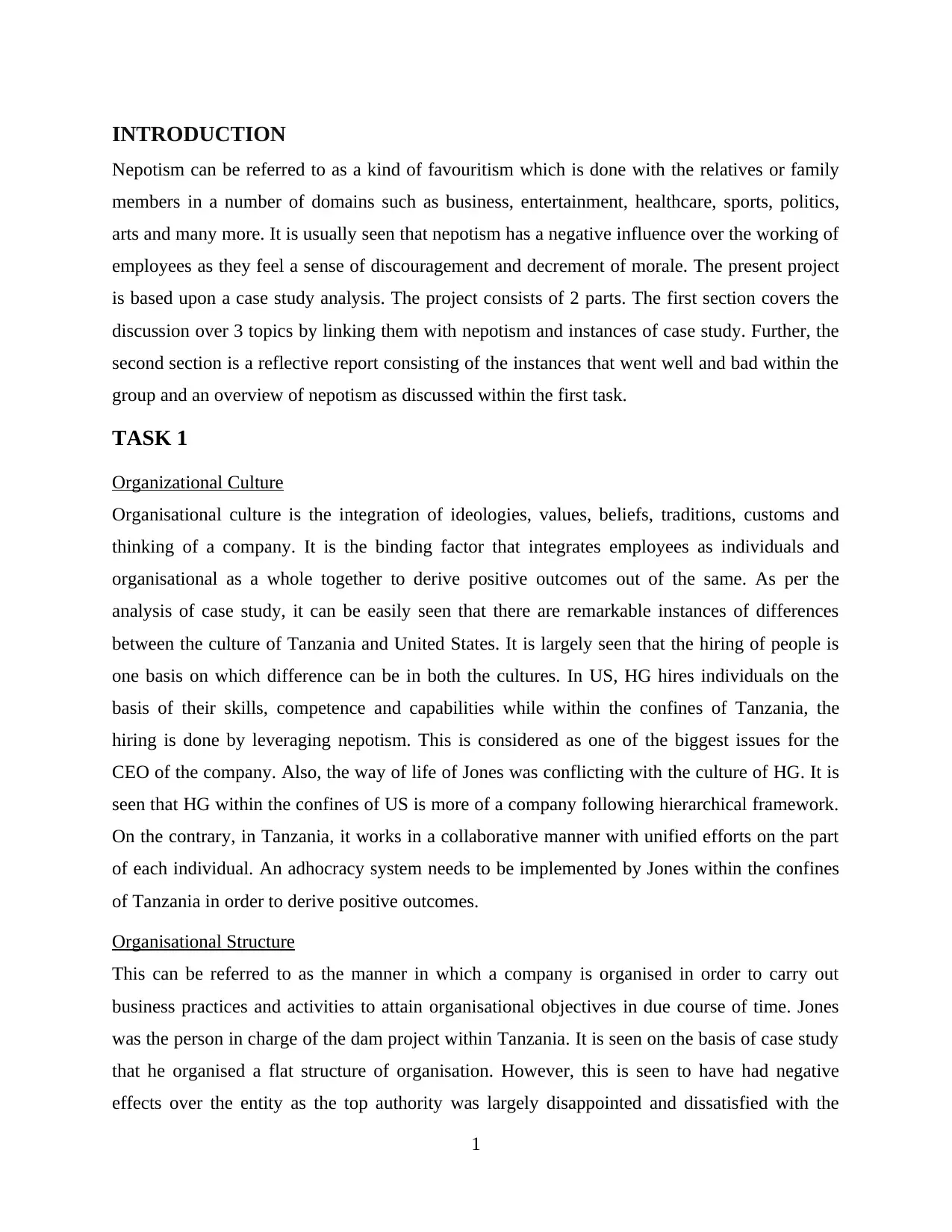
INTRODUCTION
Nepotism can be referred to as a kind of favouritism which is done with the relatives or family
members in a number of domains such as business, entertainment, healthcare, sports, politics,
arts and many more. It is usually seen that nepotism has a negative influence over the working of
employees as they feel a sense of discouragement and decrement of morale. The present project
is based upon a case study analysis. The project consists of 2 parts. The first section covers the
discussion over 3 topics by linking them with nepotism and instances of case study. Further, the
second section is a reflective report consisting of the instances that went well and bad within the
group and an overview of nepotism as discussed within the first task.
TASK 1
Organizational Culture
Organisational culture is the integration of ideologies, values, beliefs, traditions, customs and
thinking of a company. It is the binding factor that integrates employees as individuals and
organisational as a whole together to derive positive outcomes out of the same. As per the
analysis of case study, it can be easily seen that there are remarkable instances of differences
between the culture of Tanzania and United States. It is largely seen that the hiring of people is
one basis on which difference can be in both the cultures. In US, HG hires individuals on the
basis of their skills, competence and capabilities while within the confines of Tanzania, the
hiring is done by leveraging nepotism. This is considered as one of the biggest issues for the
CEO of the company. Also, the way of life of Jones was conflicting with the culture of HG. It is
seen that HG within the confines of US is more of a company following hierarchical framework.
On the contrary, in Tanzania, it works in a collaborative manner with unified efforts on the part
of each individual. An adhocracy system needs to be implemented by Jones within the confines
of Tanzania in order to derive positive outcomes.
Organisational Structure
This can be referred to as the manner in which a company is organised in order to carry out
business practices and activities to attain organisational objectives in due course of time. Jones
was the person in charge of the dam project within Tanzania. It is seen on the basis of case study
that he organised a flat structure of organisation. However, this is seen to have had negative
effects over the entity as the top authority was largely disappointed and dissatisfied with the
1
Nepotism can be referred to as a kind of favouritism which is done with the relatives or family
members in a number of domains such as business, entertainment, healthcare, sports, politics,
arts and many more. It is usually seen that nepotism has a negative influence over the working of
employees as they feel a sense of discouragement and decrement of morale. The present project
is based upon a case study analysis. The project consists of 2 parts. The first section covers the
discussion over 3 topics by linking them with nepotism and instances of case study. Further, the
second section is a reflective report consisting of the instances that went well and bad within the
group and an overview of nepotism as discussed within the first task.
TASK 1
Organizational Culture
Organisational culture is the integration of ideologies, values, beliefs, traditions, customs and
thinking of a company. It is the binding factor that integrates employees as individuals and
organisational as a whole together to derive positive outcomes out of the same. As per the
analysis of case study, it can be easily seen that there are remarkable instances of differences
between the culture of Tanzania and United States. It is largely seen that the hiring of people is
one basis on which difference can be in both the cultures. In US, HG hires individuals on the
basis of their skills, competence and capabilities while within the confines of Tanzania, the
hiring is done by leveraging nepotism. This is considered as one of the biggest issues for the
CEO of the company. Also, the way of life of Jones was conflicting with the culture of HG. It is
seen that HG within the confines of US is more of a company following hierarchical framework.
On the contrary, in Tanzania, it works in a collaborative manner with unified efforts on the part
of each individual. An adhocracy system needs to be implemented by Jones within the confines
of Tanzania in order to derive positive outcomes.
Organisational Structure
This can be referred to as the manner in which a company is organised in order to carry out
business practices and activities to attain organisational objectives in due course of time. Jones
was the person in charge of the dam project within Tanzania. It is seen on the basis of case study
that he organised a flat structure of organisation. However, this is seen to have had negative
effects over the entity as the top authority was largely disappointed and dissatisfied with the
1
⊘ This is a preview!⊘
Do you want full access?
Subscribe today to unlock all pages.

Trusted by 1+ million students worldwide
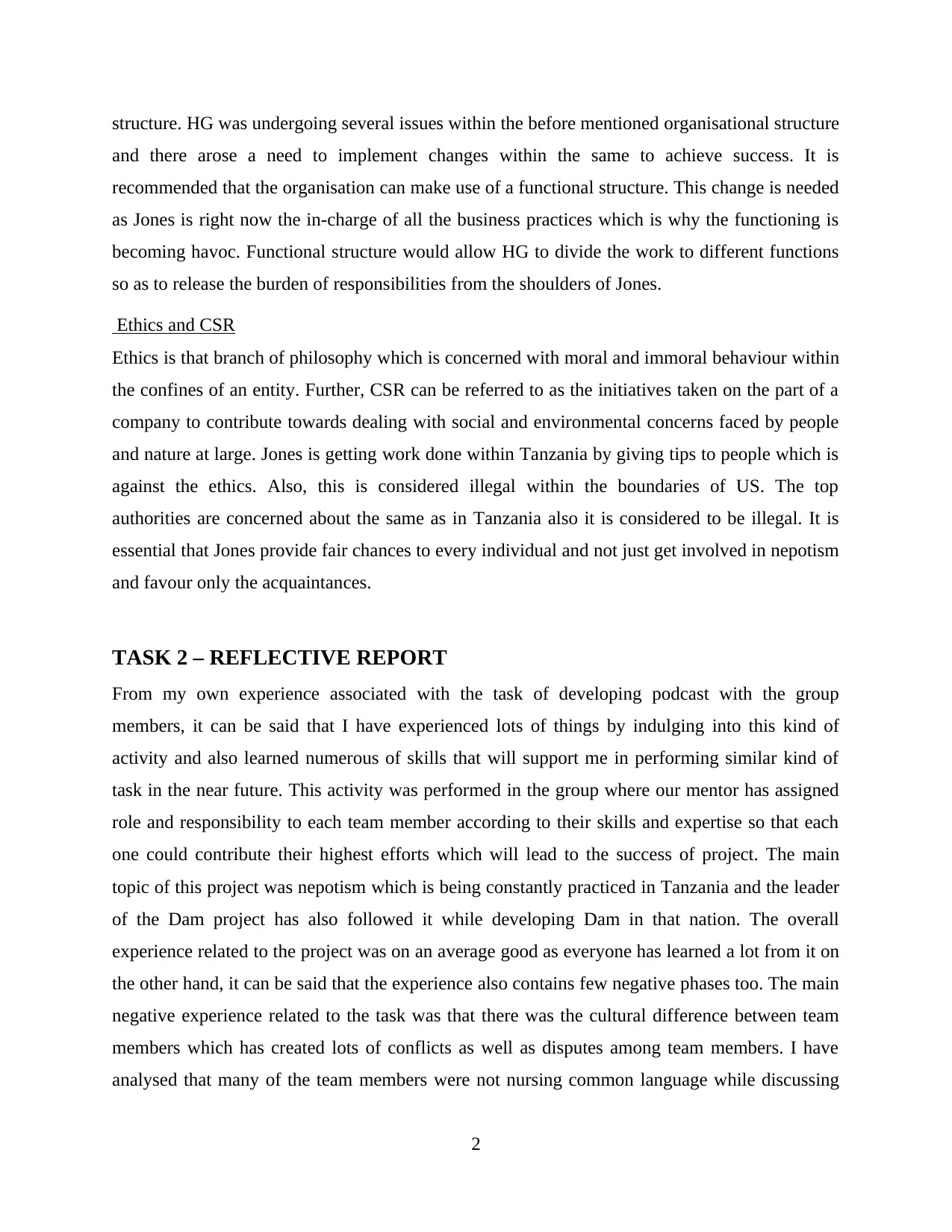
structure. HG was undergoing several issues within the before mentioned organisational structure
and there arose a need to implement changes within the same to achieve success. It is
recommended that the organisation can make use of a functional structure. This change is needed
as Jones is right now the in-charge of all the business practices which is why the functioning is
becoming havoc. Functional structure would allow HG to divide the work to different functions
so as to release the burden of responsibilities from the shoulders of Jones.
Ethics and CSR
Ethics is that branch of philosophy which is concerned with moral and immoral behaviour within
the confines of an entity. Further, CSR can be referred to as the initiatives taken on the part of a
company to contribute towards dealing with social and environmental concerns faced by people
and nature at large. Jones is getting work done within Tanzania by giving tips to people which is
against the ethics. Also, this is considered illegal within the boundaries of US. The top
authorities are concerned about the same as in Tanzania also it is considered to be illegal. It is
essential that Jones provide fair chances to every individual and not just get involved in nepotism
and favour only the acquaintances.
TASK 2 – REFLECTIVE REPORT
From my own experience associated with the task of developing podcast with the group
members, it can be said that I have experienced lots of things by indulging into this kind of
activity and also learned numerous of skills that will support me in performing similar kind of
task in the near future. This activity was performed in the group where our mentor has assigned
role and responsibility to each team member according to their skills and expertise so that each
one could contribute their highest efforts which will lead to the success of project. The main
topic of this project was nepotism which is being constantly practiced in Tanzania and the leader
of the Dam project has also followed it while developing Dam in that nation. The overall
experience related to the project was on an average good as everyone has learned a lot from it on
the other hand, it can be said that the experience also contains few negative phases too. The main
negative experience related to the task was that there was the cultural difference between team
members which has created lots of conflicts as well as disputes among team members. I have
analysed that many of the team members were not nursing common language while discussing
2
and there arose a need to implement changes within the same to achieve success. It is
recommended that the organisation can make use of a functional structure. This change is needed
as Jones is right now the in-charge of all the business practices which is why the functioning is
becoming havoc. Functional structure would allow HG to divide the work to different functions
so as to release the burden of responsibilities from the shoulders of Jones.
Ethics and CSR
Ethics is that branch of philosophy which is concerned with moral and immoral behaviour within
the confines of an entity. Further, CSR can be referred to as the initiatives taken on the part of a
company to contribute towards dealing with social and environmental concerns faced by people
and nature at large. Jones is getting work done within Tanzania by giving tips to people which is
against the ethics. Also, this is considered illegal within the boundaries of US. The top
authorities are concerned about the same as in Tanzania also it is considered to be illegal. It is
essential that Jones provide fair chances to every individual and not just get involved in nepotism
and favour only the acquaintances.
TASK 2 – REFLECTIVE REPORT
From my own experience associated with the task of developing podcast with the group
members, it can be said that I have experienced lots of things by indulging into this kind of
activity and also learned numerous of skills that will support me in performing similar kind of
task in the near future. This activity was performed in the group where our mentor has assigned
role and responsibility to each team member according to their skills and expertise so that each
one could contribute their highest efforts which will lead to the success of project. The main
topic of this project was nepotism which is being constantly practiced in Tanzania and the leader
of the Dam project has also followed it while developing Dam in that nation. The overall
experience related to the project was on an average good as everyone has learned a lot from it on
the other hand, it can be said that the experience also contains few negative phases too. The main
negative experience related to the task was that there was the cultural difference between team
members which has created lots of conflicts as well as disputes among team members. I have
analysed that many of the team members were not nursing common language while discussing
2
Paraphrase This Document
Need a fresh take? Get an instant paraphrase of this document with our AI Paraphraser
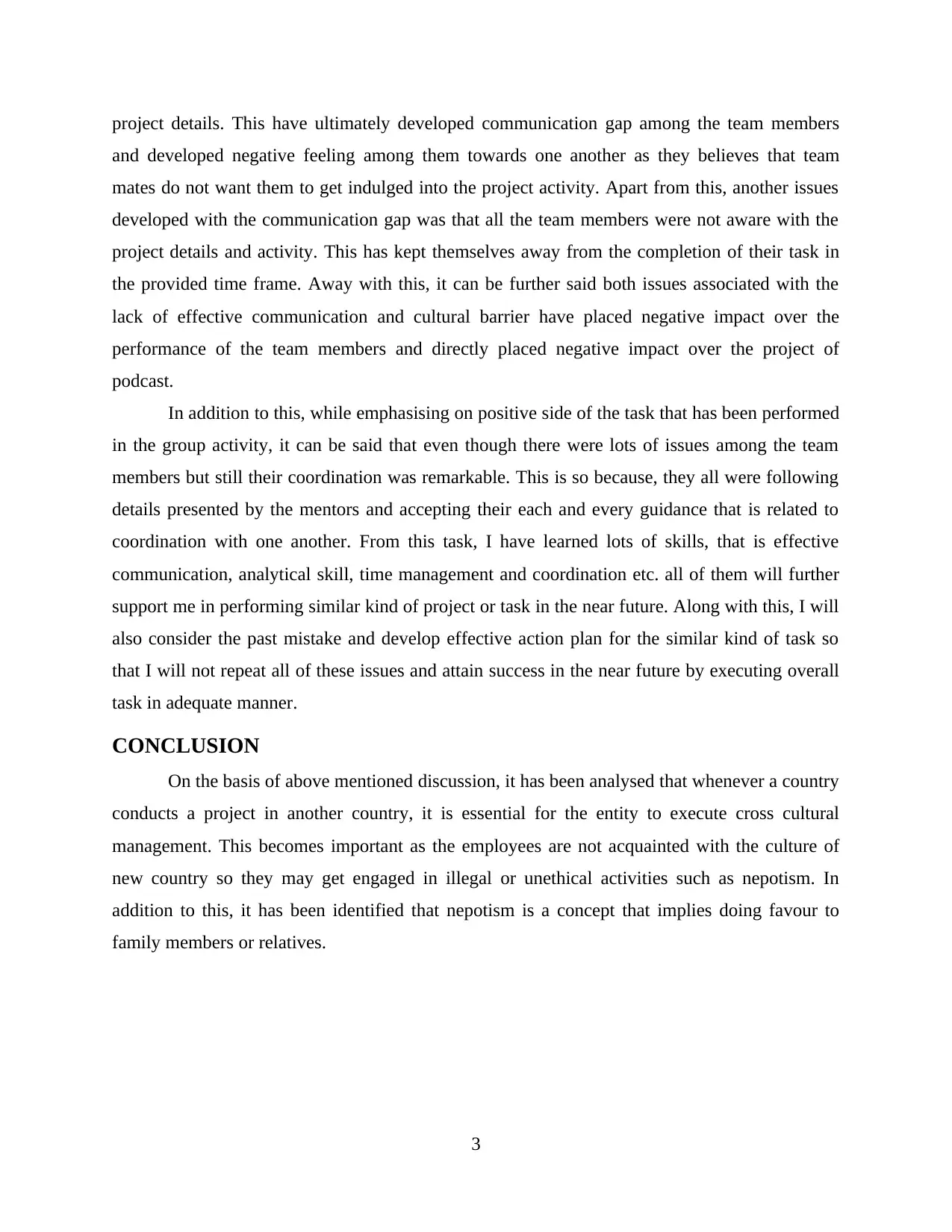
project details. This have ultimately developed communication gap among the team members
and developed negative feeling among them towards one another as they believes that team
mates do not want them to get indulged into the project activity. Apart from this, another issues
developed with the communication gap was that all the team members were not aware with the
project details and activity. This has kept themselves away from the completion of their task in
the provided time frame. Away with this, it can be further said both issues associated with the
lack of effective communication and cultural barrier have placed negative impact over the
performance of the team members and directly placed negative impact over the project of
podcast.
In addition to this, while emphasising on positive side of the task that has been performed
in the group activity, it can be said that even though there were lots of issues among the team
members but still their coordination was remarkable. This is so because, they all were following
details presented by the mentors and accepting their each and every guidance that is related to
coordination with one another. From this task, I have learned lots of skills, that is effective
communication, analytical skill, time management and coordination etc. all of them will further
support me in performing similar kind of project or task in the near future. Along with this, I will
also consider the past mistake and develop effective action plan for the similar kind of task so
that I will not repeat all of these issues and attain success in the near future by executing overall
task in adequate manner.
CONCLUSION
On the basis of above mentioned discussion, it has been analysed that whenever a country
conducts a project in another country, it is essential for the entity to execute cross cultural
management. This becomes important as the employees are not acquainted with the culture of
new country so they may get engaged in illegal or unethical activities such as nepotism. In
addition to this, it has been identified that nepotism is a concept that implies doing favour to
family members or relatives.
3
and developed negative feeling among them towards one another as they believes that team
mates do not want them to get indulged into the project activity. Apart from this, another issues
developed with the communication gap was that all the team members were not aware with the
project details and activity. This has kept themselves away from the completion of their task in
the provided time frame. Away with this, it can be further said both issues associated with the
lack of effective communication and cultural barrier have placed negative impact over the
performance of the team members and directly placed negative impact over the project of
podcast.
In addition to this, while emphasising on positive side of the task that has been performed
in the group activity, it can be said that even though there were lots of issues among the team
members but still their coordination was remarkable. This is so because, they all were following
details presented by the mentors and accepting their each and every guidance that is related to
coordination with one another. From this task, I have learned lots of skills, that is effective
communication, analytical skill, time management and coordination etc. all of them will further
support me in performing similar kind of project or task in the near future. Along with this, I will
also consider the past mistake and develop effective action plan for the similar kind of task so
that I will not repeat all of these issues and attain success in the near future by executing overall
task in adequate manner.
CONCLUSION
On the basis of above mentioned discussion, it has been analysed that whenever a country
conducts a project in another country, it is essential for the entity to execute cross cultural
management. This becomes important as the employees are not acquainted with the culture of
new country so they may get engaged in illegal or unethical activities such as nepotism. In
addition to this, it has been identified that nepotism is a concept that implies doing favour to
family members or relatives.
3
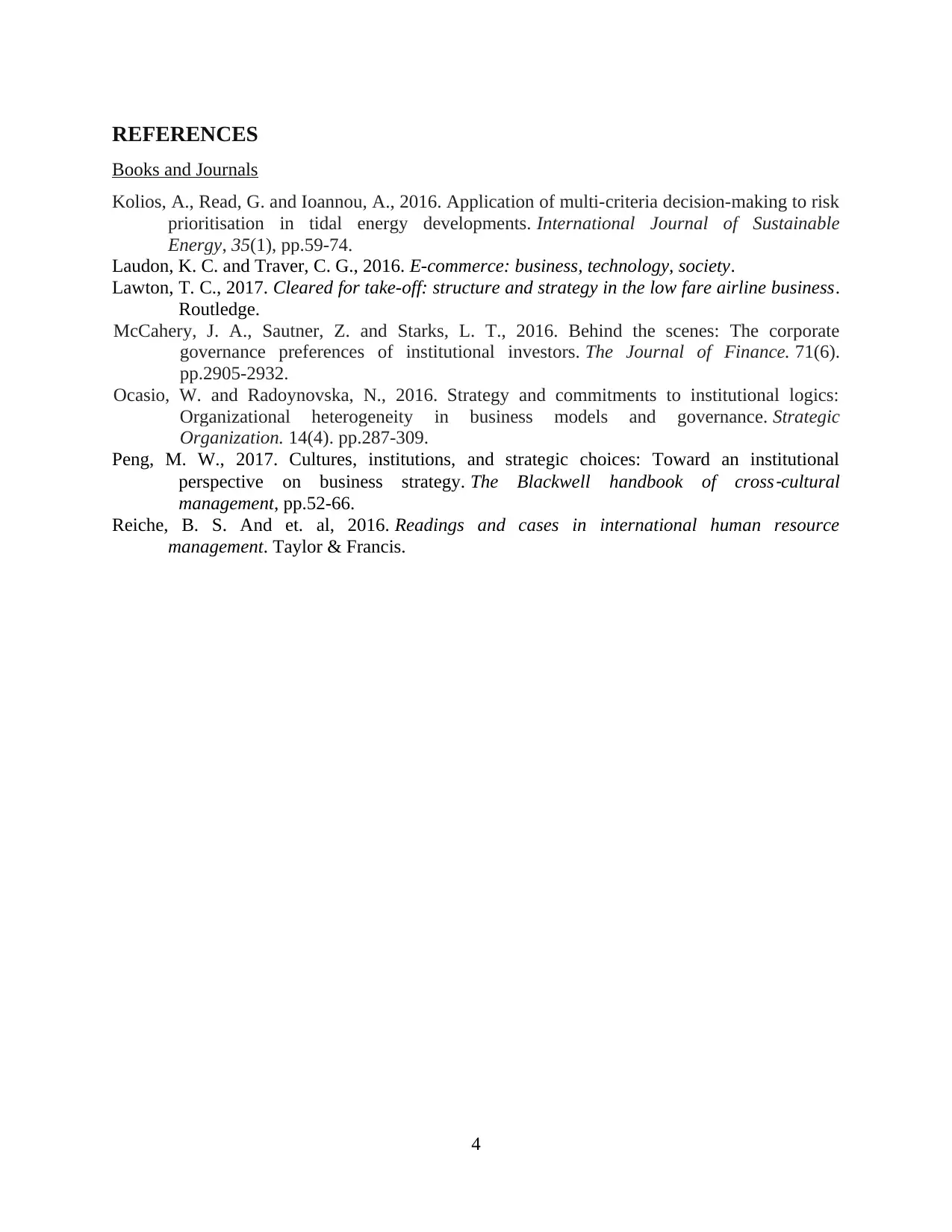
REFERENCES
Books and Journals
Kolios, A., Read, G. and Ioannou, A., 2016. Application of multi-criteria decision-making to risk
prioritisation in tidal energy developments. International Journal of Sustainable
Energy, 35(1), pp.59-74.
Laudon, K. C. and Traver, C. G., 2016. E-commerce: business, technology, society.
Lawton, T. C., 2017. Cleared for take-off: structure and strategy in the low fare airline business.
Routledge.
McCahery, J. A., Sautner, Z. and Starks, L. T., 2016. Behind the scenes: The corporate
governance preferences of institutional investors. The Journal of Finance. 71(6).
pp.2905-2932.
Ocasio, W. and Radoynovska, N., 2016. Strategy and commitments to institutional logics:
Organizational heterogeneity in business models and governance. Strategic
Organization. 14(4). pp.287-309.
Peng, M. W., 2017. Cultures, institutions, and strategic choices: Toward an institutional
perspective on business strategy. The Blackwell handbook of cross
‐cultural
management, pp.52-66.
Reiche, B. S. And et. al, 2016. Readings and cases in international human resource
management. Taylor & Francis.
4
Books and Journals
Kolios, A., Read, G. and Ioannou, A., 2016. Application of multi-criteria decision-making to risk
prioritisation in tidal energy developments. International Journal of Sustainable
Energy, 35(1), pp.59-74.
Laudon, K. C. and Traver, C. G., 2016. E-commerce: business, technology, society.
Lawton, T. C., 2017. Cleared for take-off: structure and strategy in the low fare airline business.
Routledge.
McCahery, J. A., Sautner, Z. and Starks, L. T., 2016. Behind the scenes: The corporate
governance preferences of institutional investors. The Journal of Finance. 71(6).
pp.2905-2932.
Ocasio, W. and Radoynovska, N., 2016. Strategy and commitments to institutional logics:
Organizational heterogeneity in business models and governance. Strategic
Organization. 14(4). pp.287-309.
Peng, M. W., 2017. Cultures, institutions, and strategic choices: Toward an institutional
perspective on business strategy. The Blackwell handbook of cross
‐cultural
management, pp.52-66.
Reiche, B. S. And et. al, 2016. Readings and cases in international human resource
management. Taylor & Francis.
4
⊘ This is a preview!⊘
Do you want full access?
Subscribe today to unlock all pages.

Trusted by 1+ million students worldwide
1 out of 6
Related Documents
Your All-in-One AI-Powered Toolkit for Academic Success.
+13062052269
info@desklib.com
Available 24*7 on WhatsApp / Email
![[object Object]](/_next/static/media/star-bottom.7253800d.svg)
Unlock your academic potential
Copyright © 2020–2026 A2Z Services. All Rights Reserved. Developed and managed by ZUCOL.





